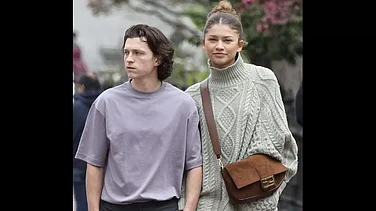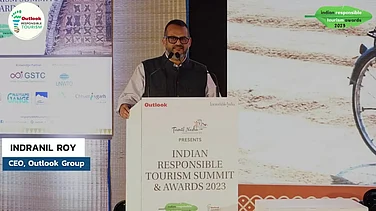Nestled in the thickly forested region of Malenadu in the Western Ghats, Karnataka's Agumbe is synonymous with rainforest conservation. A small village, also called 'the Cherrapunji of South India' on the account of rainfall it receives, Agumbe is also home to the King Cobra. A species both revered and feared, King Cobras are awe-inspiring, reaching up to 18 feet in length, taking the crown for the longest venomous snakes in the world. While stories about King Cobra in Indian mythology adds to its mysticism, biologist P Gowri Shankar aims to unravel the mysterious and often misunderstood reptile, right in the creature's abode.
Advertisement

As a field biologist, Gowri Shankar has been studying the natural history of king cobras for over two decades. His passion is rooted in a deep understanding of rainforest ecosystems and their value in reptile conservation. “Habitat loss in Southeast Asia is amongst the highest and most severe; in terms of biodiversity loss. The tropical forests of Southeast Asia contribute 18 to 20 per cent to the carbon sink. King Cobras are primarily found in this region. They are potential flagship species in the herpetofauna (Reptile and amphibian) world,” he says.
His fascination with the species started in his childhood, when a 9-year-old Gowri Shankar sighted a cobra in his backyard. “I found them extremely interesting, but all I heard about them were negative. This conflict between wonder and myths got me curious. Since then I aspired to learn more and dreamt of living in a forest with snakes around me. I caught my first snake when I was thirteen years old. Every step forward- be it herping, research, or captive management, springs from that primal chord of passion that struck me as a child,” he adds.
Advertisement

Several decades later, he feels his journey has just begun. In India, the king cobra has been listed as ‘vulnerable’ on the IUCN Red List since 2010, and placed under Schedule II of the Wildlife Protection Act, 1972. Timid and non-confrontational by nature, the animal’s habitat is threatened by urban development, human-snake conflicts and deforestation. Gowri Shankar believes these could have long-lasting ramifications. “King Cobras suffer from habitat destruction, poaching for skin, for consumption, and the pet trade. In certain areas, they are killed on sight due to fear and intolerance. The befuddling species complex assignment for King Cobras has not been resolved for almost two hundred years due to a lack of data and research. This has impeded addressing issues like biological control and snake-bite treatment. More worrisome is the risk of permanently losing specific species of King Cobras, even before they are recognized, studied and understood,” expresses the biologist.
Kalinga Centre for Rainforest Ecology (KCRE)

While Gowri Shankar has been researching the reptile for a long time, he believes conservation can not begin without education. This led to the birth of Kalinga Centre for Rainforest Ecology (KCRE ), deep in the silvery-fog covered forested land of Agumbe, in 2012. KCRE provides a platform where one can learn the tools and act for conservation. It is among the few research sites in India that welcome people to engage in direct conservation.
Agumbe, with its snake population, offers the perfect base for research on King Cobras. It was here that Romulus Whitaker, a herpetologist and wildlife conservationist, studied the species, establishing Agumbe Rainforest Research Station in 2005 to formulate a database for the protection of this endangered reptile.
Advertisement
At KCRE, researchers can conduct their own studies or assist the team in one of their ongoing projects, such as the ‘King cobra rescue and relocation and breeding biology’ project. Visitors can choose from various camping options available at the centre. Gowri Shankar and his team also offer general treks, nature photography, bird watching, herping, specialised workshops focusing on reptile ecology and courses on field techniques for those who wish to immerse themselves in rainforest ecology and wildlife conservation.

They also conduct environmental education programs for local schools, colleges, and village communities, which assumes greater importance in light of rising human-snake conflicts. Gowri Shankar has rescued and relocated over 350 king cobras from distress situations and monitored over 50 king cobra nests, creating an atmosphere of trust amid local communities who now reach out to him and his team with rescue calls. Such is the impact that Agumbe locals are now involved in KCRE’s rescue missions.
Advertisement
“Education is the primary goal of KCRE, it has been helping change people's attitudes towards our environment. The STORM (Scientific Training on Reptile Management) workshop that we pioneered has become the go-to place for anyone wanting to learn ethical methods of rescue and relocation of snakes. We have trained over 900 people now and every year the numbers are increasing. This is indicative of the fact that so many people now tolerate, know more, and care more for snakes than their seniors,” Gowri adds.

The cause for King Cobra’s protection has since been taken up by many other organisations in the country, especially by promoting community-based conservation efforts. Eastern Ghats Wildlife Society is spearheading the conservation of King Cobras in north coastal Andhra Pradesh. Gowri Shankar is also a part of King Cobra Conservancy, an NGO whose members represent some of the world's foremost experts on snakes, with combined decades of experience studying behaviour, ecology, and habitats related to King Cobras. They have a mutual aim - to ensure a better understanding of the apex reptile’s role within the tropical Asian landscape, and its importance in the lives of people.
Advertisement

On why he continues on an uphill road to ensure conservation of this magnificent creature, Gowri has a simple answer. “They are part of the rainforest. King cobra is an apex predator. Just like the tiger, if kings are conserved, we conserve all the other dependents in the food chain."




















